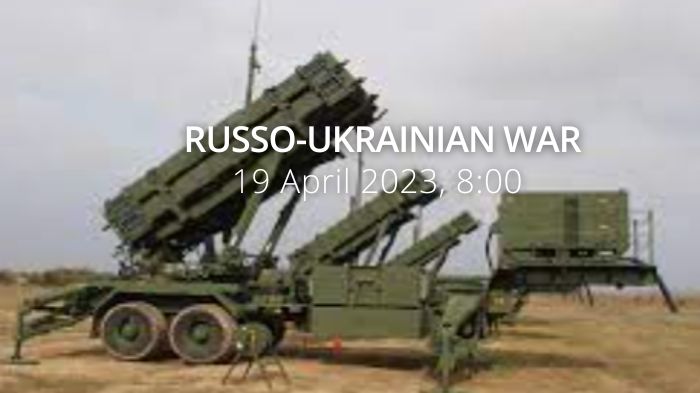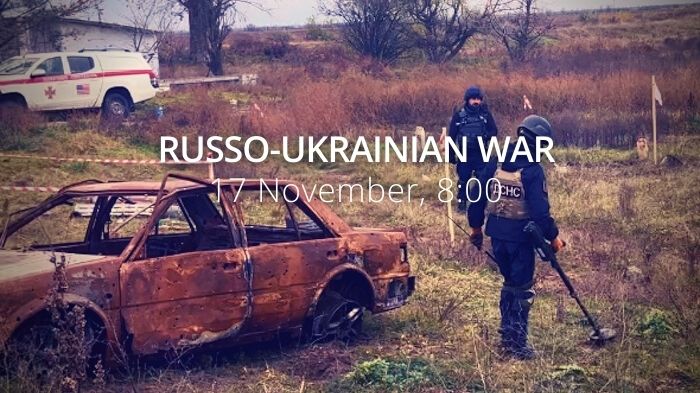Bulgaria signs a declaration of support for Ukraine’s NATO membership after the war. US supports Ukraine’s accession to NATO when Ukraine meets all requirements – White House. Ukrainian and Russian officials largely de-escalated their rhetoric regarding the Zaporizhzhia Nuclear Power Plant (ZNPP).
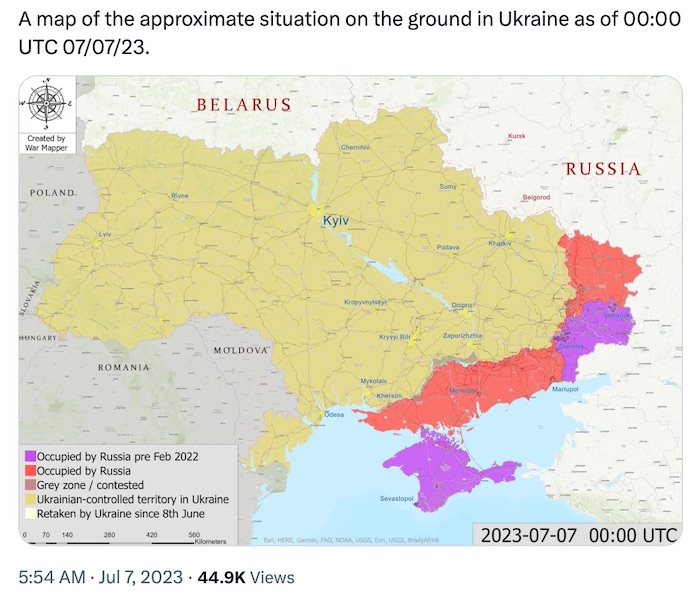
Daily overview — Summary report, July 7
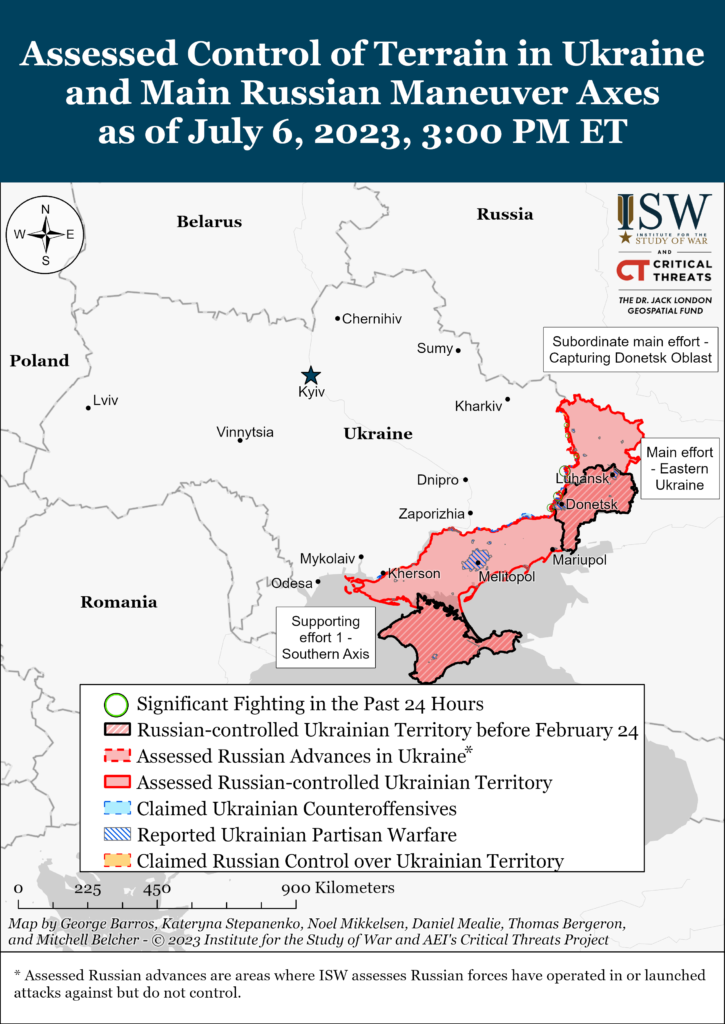
The General Staff’s operational update regarding the Russian invasion as of 18.00 pm, July 7, 2023 is in the dropdown menu below:
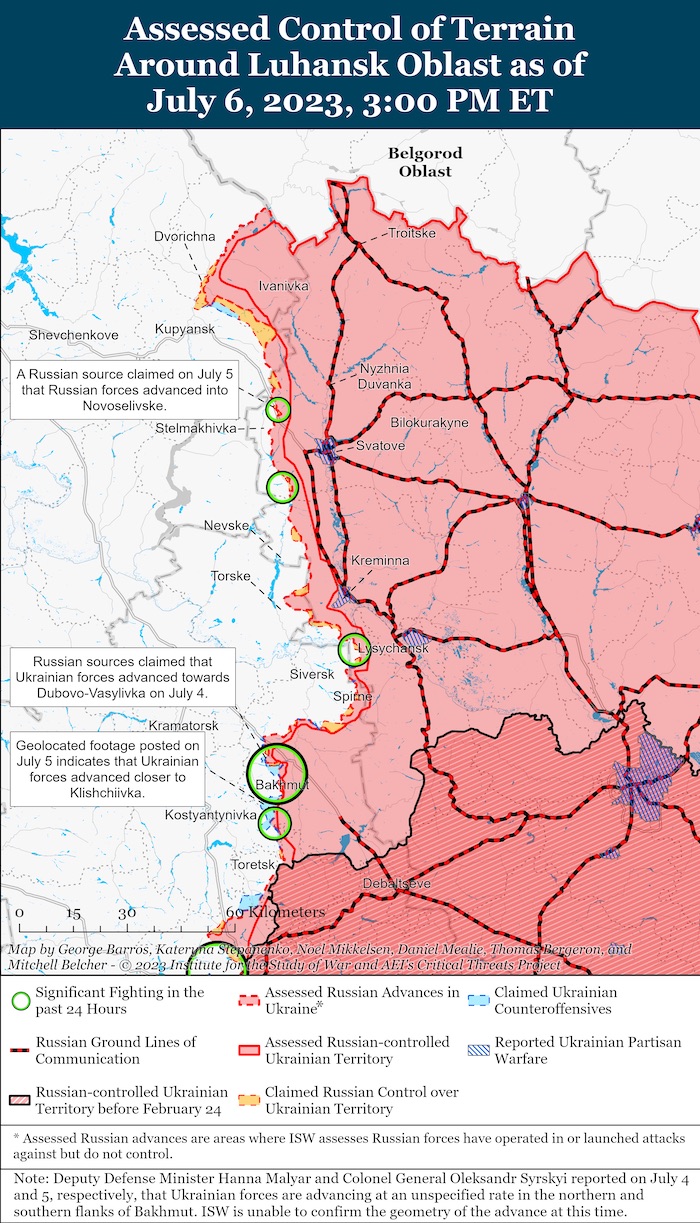
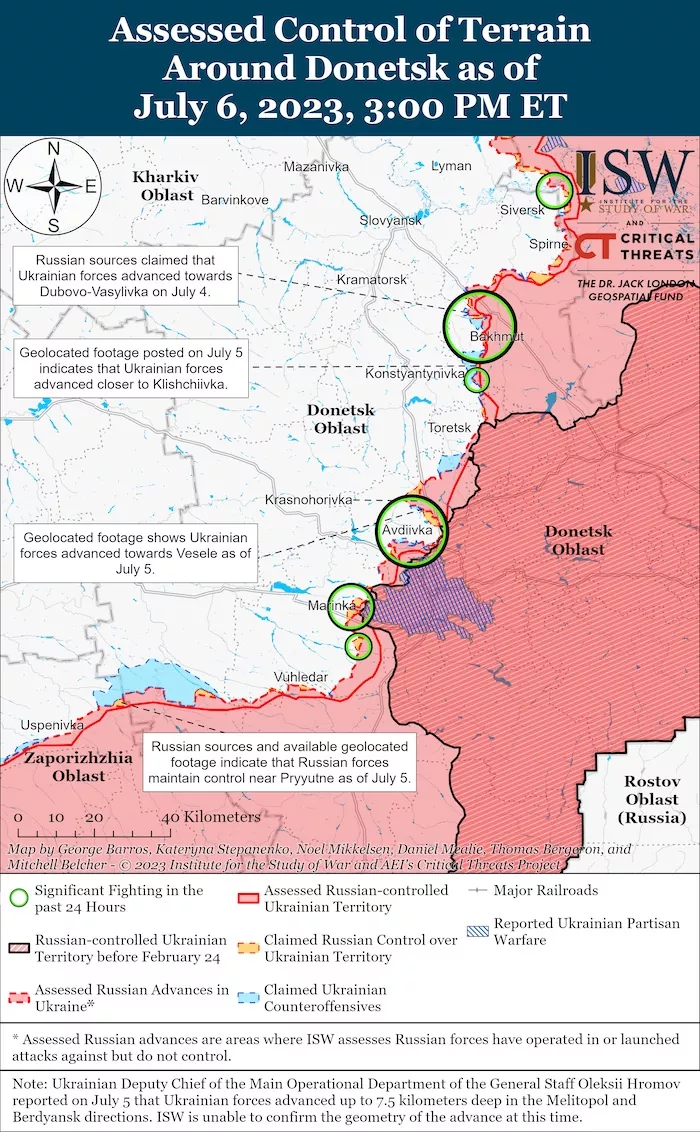
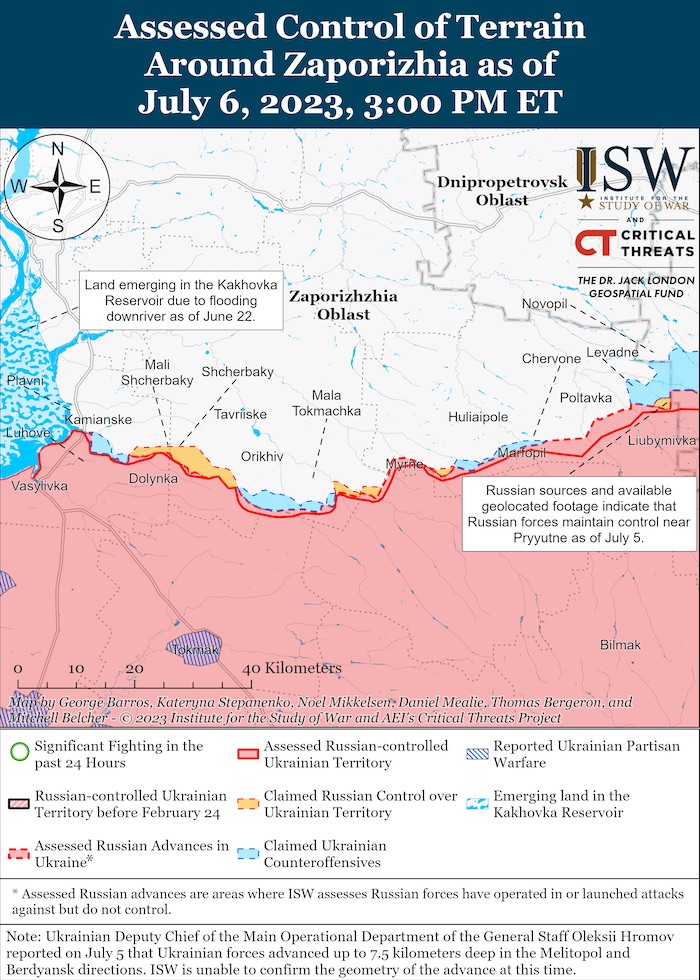
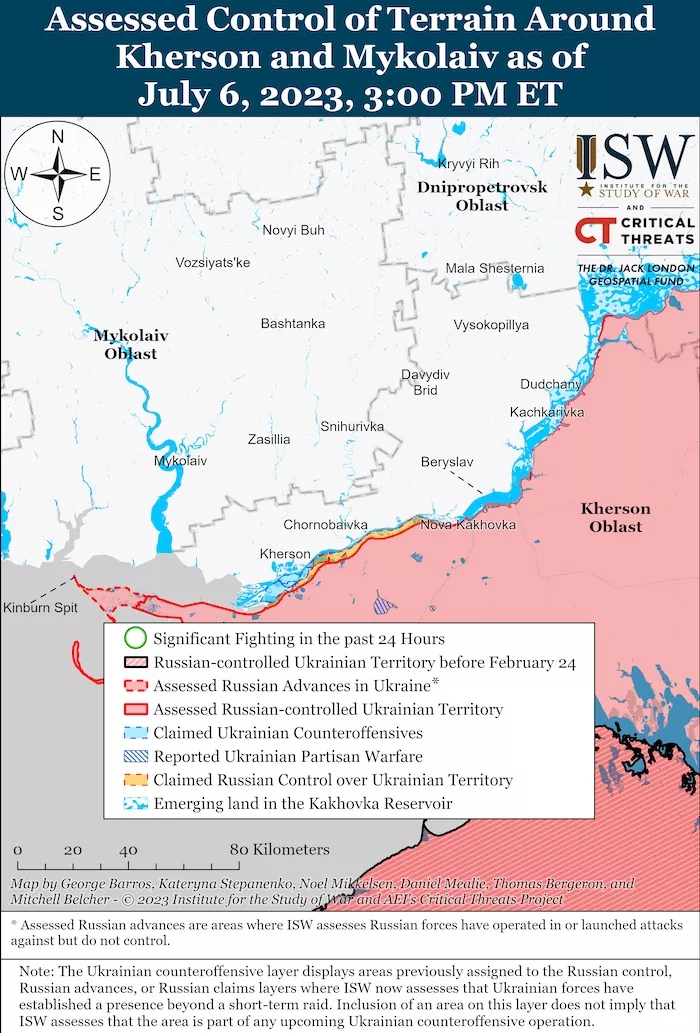
Military Updates
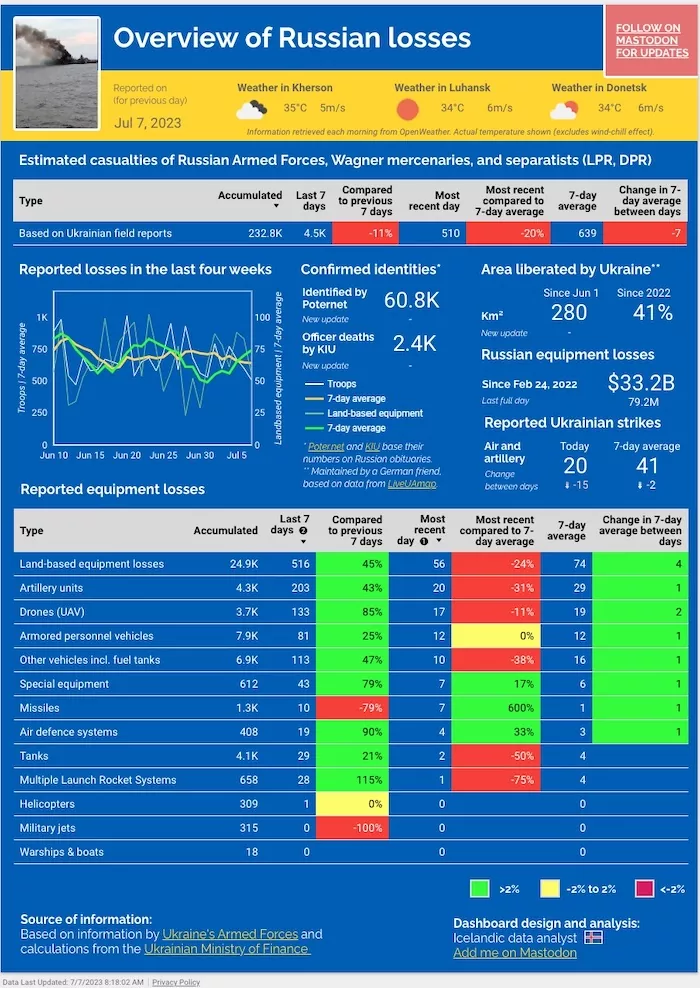
Russia shifts troops across sectors amid uncertainty over Ukraine’s upcoming attacks – military. The Russian troops are forced to constantly redeploy their units across the southern front in anticipation of the next Ukrainian attack, and the Ukrainian forces are taking advantage of that. This was stated by Major Valerii Shershen, spokesperson of the Joint Press Center of the Ukrainian Defense Forces of the Tauria sector, during an online briefing at the Military Media Center.
Russia plans to mobilize additional 500,000 soldiers – Ukraine’s General Staff. The Kremlin plans to recruit up to 500,000 people to the Russian Armed Forces to replenish the losses in Ukraine, according to Oleksii Hromov, Deputy Chief of the Main Operational Directorate of the General Staff of the Armed Forces of Ukraine. Russia is getting ready to fully provide its armed forces with significant mobilization resources to wage a long war of attrition, Oleksii Hromov said in his interview with Ukrinform news agency.
According to British Defence Intelligence, (last 48 hours):
https://twitter.com/DefenceHQ/status/1677240337478066176
- On 1 July 2023, the Russian Navy established a new Azov Naval District, headquartered in the occupied Ukrainian port city of Mariupol.
- Subordinate to the Black Sea Fleet (BSF), the district will reportedly command eight warships including three modern, Karakurt class corvettes which can launch SS-N-30A Kalibr cruise missiles.
- The Azov Sea is a vital maritime area for Russia because it links its inland waterways to international maritime routes. In the context of the war, it also offers an alternative military resupply option should Russia’s over-land routes to southern Ukraine be disrupted.
- The Azov Naval District will likely focus on supporting logistical and counter-partisan tasks, freeing up the main BSF to concentrate on long range strike operations and projecting maritime power further abroad.
Losses of the Russian army
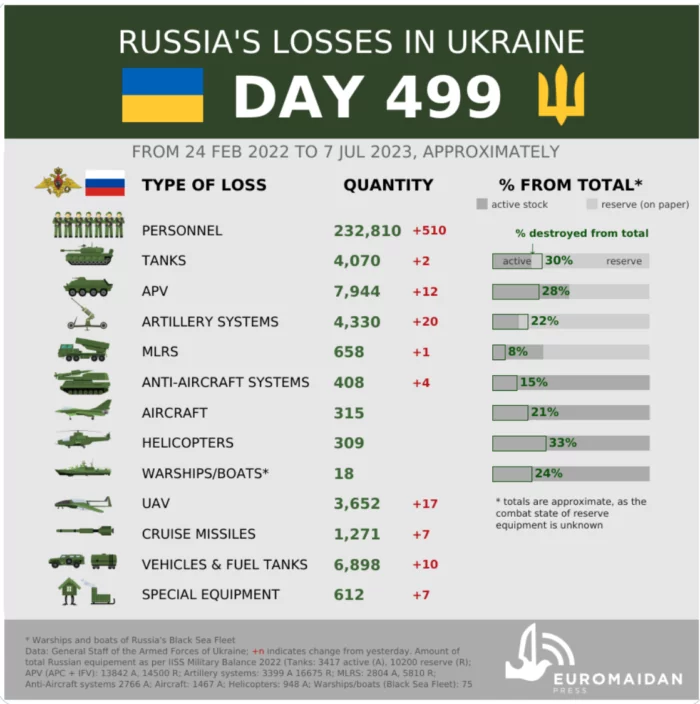
Humanitarian
Russian artillery attack kills one and injures four civilians in Donetsk Oblast. On 6 July, Russian troops launched an artillery attack on Toretsk сity and Novomykhailivka village in Donetsk Oblast, the regional Prosecutor’s Office reported. According to an investigation opened into the Russian attack, a 56-year-old woman and 57-year-old man were injured after rockets targeted Novomykhailivka’s private sector. Both civilians were hospitalized.
45 Ukrainian defenders return home from Russian captivity – Presidential Office. On 6 July, 45 Ukrainian defenders returned home from Russian captivity, said the Head of the Presidential Office of Ukraine, Andrii Yermak. “We managed to bring back 45 of our soldiers from captivity, including two officers, 41 soldiers, a sergeant, a civilian employee of Azovstal, and a volunteer defender from Kherson,” he wrote on Telegram.
Russian missile attack kills at least six, injures 35 people in Lviv (updated): 10 killed. Ukraine’s Interior Ministry reported that a Russian missile attack damaged a four-storey apartment building in Lviv, destroying the 3rd and 4th floors in two entrances. “A search and rescue operation is underway. As of 7:00 a.m., four people were killed and nine injured. Rescuers rescued seven people and evacuated 64,” the Ministry reported at 7:70, adding that “There is information that people may still be under the rubble.”
Russian army shells residential areas in Kherson Oblast’s Bilozerka. On Wednesday, 5 July, the indiscriminate shelling of the residential areas in Bilozerka (Kherson Oblast, southern Ukraine) killed a 58-year-old man, according to Andriy Yermak, the Head of the Office of the President of Ukraine. A 10-year-old boy and a 56-year-old woman were injured. A 51-year-old man and two women, aged 70 and 41, sustained minor injuries due to the artillery strike on their house, according to Andriy Yermak.
Legal
https://euromaidanpress.com/2023/07/06/how-unsanctioned-russian-companies-fuel-deadly-drone-and-missile-attacks-on-ukraine/?swcfpc=1
Support
US plans to supply Ukraine with cluster munitions, officials say – Reuters. The US plans to send cluster munitions to Ukraine to help it battle Russian invaders, anonymous US officials told Reuters on 6 July. Meanwhile, Human Rights Watch (HRW) campaigns against the supplies despite the fact that Russia has been actively using this type of munitions since the beginning of the full-scale invasion.
UK to start training Ukrainian pilots in August. Britain will begin basic training of 20 Ukrainian pilots in August, UK’s Minister of State for the Armed Forces, James Heappey said, according to Yevropeiska Pravda. The initial phase of training will be a basic ground apprenticeship, following which the Ukrainian military will be ready for specialized training to operate the F-16 fighter jets.
New Developments
Zelenskyy meets with Denkov, Radev in Bulgaria. On 6 July, Ukrainian President Volodymyr Zelenskyy met with the President of Bulgaria, Rumen Radev and the Prime Minister, Nikolai Denkov, in Sofia. Russia must withdraw its troops from the territory of Ukraine and should be held accountable for crimes it has committed, said Denkov during a press conference with the Ukrainian leader, according to UkrInform.
Bulgaria signs a declaration of support for Ukraine’s NATO membership after Russian war. Bulgaria has signed a declaration of support for Ukraine’s aspirations to join NATO after the end of the Russian war, Chairman of the Verkhovna Rada of Ukraine Ruslan Stefanchuk has announced. According to him, the document states that the National Assembly of Bulgaria expects from its government, particularly at the upcoming Alliance summit in Vilnius, to express a position of support for Ukraine’s NATO accession after the restoration of peace on its territory.
US supports Ukraine’s accession to NATO when Ukraine meets all requirements – WH. The White House supports Ukraine’s accession to NATO on the condition that Ukraine meets all the requirements of the Alliance, Karine Jean-Pierre, White House Press Secretary, said during a briefing on 5 July. “Any decision on NATO membership is between the 31 Allies and aspirant country. And so, in this case, when it comes to Ukraine, we have been discussing with our NATO Allies and Ukraine how we can collectively support Ukraine’s aspiration for Euro-Atlantic integration.” Jean-Pierre added.
West needs to change its attitude toward Russia, Ukraine’s Foreign Ministry says after White House statement on necessity for reforms for accession to NATO. In response to the recent White House statement, which said that Ukraine would need to undergo reforms to meet the same standards as any NATO country before joining the Alliance, Oleh Nikolenko, a spokesperson for the Ministry of Foreign Affairs of Ukraine, stated that the West needed to reform its attitude toward Russia.
Remains of eight British WWII-era Hurricane aircraft found near Kyiv. On 6 July, the Kyiv authorities showed journalists the remains of several Hawker Hurricane fighter aircraft sent by the UK to the USSR under the Lend-Lease program during World War II. The remnants of eight Hurricanes have been recently discovered in Kyiv Oblast.
Zelenskyy wished that Ukraine had started counteroffensive “much earlier” – CNN. Ukraine’s counteroffensive has been “slowed down” by entrenched Russian defenses, President Volodymyr Zelenskyy told CNN in an interview broadcast on 5 July, adding that he wished that Western weapons deliveries had allowed it to begin “much earlier.” He said that the Ukrainian military cannot “even think of starting” attacks in some areas of the country, having no “relevant weapons.”
Foreign policy experts urge NATO to offer Ukraine membership roadmap at Vilnius summit. In an open letter, 46 foreign policy experts called on NATO to offer Ukraine a clear path to accession at NATO Summit in Vilnius, Lithuania. Politico published the full text of the letter on 5 July 2023. The open letter was signed by US Army General Philip Breedlove, 17th Supreme Allied Commander Europe (retired); Stephen E. Biegun, former US Deputy Secretary of State; Ian Brzezinski, former deputy assistant secretary of defense for Europe and NATO Policy; US Army General Wesley Clark, 12th Supreme Allied Commander Europe; Ben Hodges, former commanding general of the US Army Europe; Alexander Vershbow, distinguished fellow at the Atlantic Council and former NATO deputy secretary general; Kurt Volker, former US ambassador to NATO and former US special representative for Ukraine negotiations, and others.
US, German companies lead in tax payments to Russian budget – report. Western companies who remained in Russia contributed $3.5 bn in taxes to the Russian budget — nearly a quarter of all tax revenue. Leading the list are alcohol and tobacco companies and fast-paced consumer goods; companies say their products are “essential”
Assessment
- On the war.
The Institute for the Study of War has made the following assessment as of July 6, 2022:
Belarusian President Alexander Lukashenko stated that Wagner Group financier Yevgeny Prigozhin and Wagner forces are not in Belarus as of July 6, indicating that Prigozhin may be failing to uphold the deal Lukashenko mediated between Prigozhin and Russian President Vladimir Putin following Wagner’s armed rebellion on June 24. Lukashenko and the Kremlin previously announced that Prigozhin, Putin, and Lukashenko reached an agreement that offered Prigozhin and the Wagner forces that participated in the rebellion unspecified security guarantees in Belarus.[1] The full contents of this agreement have not been revealed, but it appears that Wagner is not fulfilling its end of the deal. Lukashenko stated on July 6 that Wagner forces are currently at their permanent camps (either in Russia or in Ukraine) to which they withdrew following the Battle for Bakhmut.[2] Lukashenko added that Prigozhin is in St. Petersburg or may have even flown to Moscow on the morning of July 6. Lukashenko denied the reports that Belarus is constructing new training camps for Wagner forces and noted that Belarus offered Wagner several former Soviet military camps including some near Asipovichy, Mogilev Oblast.[3] Lukashenko implied that Wagner had not yet agreed to deploy to these bases and that Wagner “has a different vision for [their] deployment,” the details of which Lukashenko refused to share.[4] Lukashenko, however, denied that the deal has been terminated and noted that the question of Wagner forces’ transfer and setup “has not been decided” at the moment.[5]
Russian sources also indicated that Prigozhin is in Russia, although ISW cannot confirm Prigozhin’s whereabouts at this time. A Russian opposition outlet reported that Prigozhin’s plane landed in Rostov Oblast after flying from Moscow Oblast on the morning of July 6.[6] A St. Petersburg outlet reported on July 5 that Prigozhin personally picked up several small arms seized by the Russian Federal Security Service (FSB) from the FSB building in St. Petersburg on July 4.[7] The outlet also reported that Prigozhin was in Moscow over the weekend on July 1 and July 2.[8] ISW had not observed any visual confirmations in the open source that Wagner personnel deployed to Belarus at this time. Kremlin Spokesperson Dmitry Peskov also claimed that the Kremlin does not follow Prigozhin’s movements, noting that the Kremlin cannot and does not want to follow Prigozhin.[9] Peskov’s statement is absurd given that the Kremlin and Russian security forces have the ability to detain Prigozhin or restrict his movements in Russia. It is particularly absurd if Prigozhin was actually able to collect his weapons from an FSB facility.
Lukashenko appears to be distancing himself from the deal he reportedly mediated while continuing to tout his ability to mediate between Putin and a formerly loyal lieutenant in the first place, thus still highlighting Putin’s weakness. Lukashenko demonstratively stated that Wagner and Prigozhin are Russian, and the questions about their whereabouts should not be directed to him. Lukashenko appears to be distancing himself from Wagner, and his rhetoric may suggest that he is pinning the responsibility on the Kremlin to enforce the deal. Lukashenko also continued to boast about his skillful negotiations with Prigozhin after stating that Putin’s authority was not weakened during the armed rebellion in response to a journalist’s question.
Prigozhin’s ability to freely operate in Russia suggests that Prigozhin is still protected by some security guarantees and/or that the Kremlin continues to prioritize undermining his reputation in Russia over targeting Prigozhin physically or legally. Lukashenko noted that neither he nor Russian President Vladimir Putin wanted to assassinate Prigozhin, and dismissed suggestions that Putin might attempt to kill Prigozhin in the future.[10] ISW assessed on June 27 that Putin has likely decided that he cannot directly eliminate Prigozhin without making him a martyr for causes concerning the Russian Ministry of Defense’s (MoD) mishandling of the invasion.[11] ISW also observed on June 27 that the Kremlin launched an information operation aimed at presenting Prigozhin as corrupt and a liar, and Russian state outlets have maintained this narrative since. Russian propaganda networks are extensively covering FSB’s raids of Prigozhin’s mansion and his wealth, and one journalist sarcastically called Prigozhin’s house a “palace belonging to the fighter against corruption” on Russian state TV channel Rossiya 1.[12]
Select Russian ultranationalists criticized Russian state propaganda for attempting to villainize Prigozhin, however, suggesting that the Kremlin’s attempt to alienate the ultranationalist community from Prigozhin is not succeeding. A Wagner-affiliated Telegram channel accused the Russian Ministry of Internal Affairs of deliberately leaking footage of the FSB raids to the media in order to portray Prigozhin as a traitor who is only interested in a lavish lifestyle.[13] Another Wagner-affiliated Telegram channel attempted to disprove Rossiya 1’s suggestion that the FSB may have found narcotics at Prigozhin’s mansion.[14] It is not necessarily surprising that Wagner-affiliated milbloggers are attacking Kremlin efforts to blackguard Prigozhi, but a Kremlin-affiliated milblogger also condemned the Russian media’s efforts to portray Prigozhin as a corrupt individual, noting that Prigozhin’s home is consistent with that of a wealthy individual and that Prigozhin appears to showcase his military awards throughout his mansion.[15] Another milblogger noted that Prigozhin’s house did not appear that lavish when compared to other Russian billionaires.[16]
Ukrainian forces conducted counteroffensive operations on at least three sectors of the front on July 6 and are continuing efforts to gradually degrade Russian manpower and logistics assets. Ukrainian military officials reported that Ukrainian forces are conducting counteroffensive activities in the Bakhmut, western Donetsk, and western Zaporizhzhia directions.[17] Geolocated footage posted on July 6 shows that Ukrainian troops have advanced towards the western outskirts of Klishchiivka, about 5km southwest of Bakhmut.[18] Russian and Ukrainian sources continued to discuss Ukrainian counteroffensive operations in western Donetsk Oblast south of Velyka Novosilka and in the Orikhiv area in western Zaporizhzhia Oblast.[19] Ukrainian President Volodymyr Zelensky acknowledged the generally slower pace of Ukrainian counteroffensive gains in an interview with CNN on July 5 and stated that Ukrainian operations have “slowed down” against entrenched Russian defensive positions, remarking that he believes Ukraine still needs certain Western weapons systems before launching new attacks along the front.[20] Ukrainian Deputy Defense Minister Hanna Maliar emphasized that the Ukrainian efforts to strike Russian concentration areas are imperative for the wider counteroffensive and contribute to the slower rate of ground attacks across the theater. Maliar noted that Ukrainian forces destroyed six Russian ammunition depots in the Tavriisk (Zaporizhzhia) direction alone in the past day and confirmed that the July 4 strike on Makiivka was an effective example of the destruction of Russian artillery and equipment assets.[21]
Ukrainian and Russian officials largely de-escalated their rhetoric regarding the Zaporizhzhia Nuclear Power Plant (ZNPP) on July 6. Ukrainian Main Military Intelligence Directorate (GUR) Head Kyrylo Budanov stated on July 6 that the danger of a man-made disaster at the ZNPP is “gradually decreasing,” following warnings by various Ukrainian officials on July 4 that Russian forces may have placed objects resembling explosive devices on the roofs of two of the ZNPP’s reactor buildings.[22] First Deputy Chief of Staff of the Russian Presidential Administration Sergey Kiriyenko and Zaporizhzhia Oblast occupation head Yevgeny Balitsky also notably visited the ZNPP on July 6 and posted images reportedly near the plant’s dry nuclear waste storage facility.[23] Kiriyenko and Balitsky noted that the plant continues to “operate normally” under Russian control, thus downplaying previous Russian claims that Ukrainian actions were imminently threatening the safety of the ZNPP.[24] Kiriyenko and Balitsky may have visited the plant to portray Russia as a capable custodian of the ZNPP, and their rhetorical posturing during the visit suggests that Russian officials may be stepping back from harsh warnings of imminent disaster at the plant. ISW continues to assess that Russian rhetoric surrounding the ZNPP is meant to discourage Western support for Ukraine by accusing Ukraine of nuclear irresponsibility, as well as to dissuade Ukrainian forces from conducting counteroffensive operations into occupied Zaporizhzhia Oblast.[25]
Russian political actors continue attempts to court or control Russian milbloggers, indicating that many view the milblogger community as a critical constituency. Russian Liberal Democratic Party (LDNR) head Leonid Slutsky met with select milbloggers on July 5 to discuss a series of proposals to grant benefits and protections to military correspondents and bloggers covering the war in Ukraine.[26] Slutsky stated that the LDNR will aim to pass legislation that will grant military correspondents the status of combat veterans and provide state guarantees and payments in cases of injury or death.[27] Slutsky claimed that the LDNR sent relevant proposals about Russian military correspondents and bloggers to the Russian MoD and the Ministry of Digital Development.[28] Slutsky added the LDNR and select milbloggers will launch an educational program to teach youth about the “informational realities” of the war in Ukraine.[29] Russian pundits on the Kremlin-affiliated show Solovyov Live recently discussed milbloggers’ potential violation of operational security in Ukraine and urged them to engage in some degree of self-censorship.[30] The Kremlin has routinely sought to appeal to select Russian milbloggers in a bid to win the favor of the community and leverage their connections to the wider Russian ultranationalist community, although the Russian MoD has recently indicated that it once again seeks to curb select milblogger activity.[31] It is unclear what backing the LDNR proposals have from the Kremlin, although the Kremlin could use such measures to exert control over milbloggers and determine who qualifies as a recognized milblogger.
The growing prominence of the milblogger community within the Russian information space and in certain accepted Russian civil society movements is likely creating a competition amongst various political actors vying for control over what is viewed as a critical constituency, either through winning their favor or by establishing authority over their activities. These political actors, both those firmly within the Kremlin’s orbit and those further outside of it, likely believe that it has yet to be decided who will control the political influence of this constituency. Milbloggers, with their own diverging interests and allegiances, have yet to indicate how the overall community will respond to this growing competition for their influence.
Russian opposition media outlet Vertska reported that Russian forces and occupation authorities are conducting a campaign of systematic religious persecution in occupied Ukraine. Verstka found that Russian forces and occupation authorities have committed at least 109 acts of religious persecution and destroyed nearly 600 places of worship in Ukraine since February 24, 2022.[32] Verstka uncovered the stories of people whom Russian forces and occupation authorities kidnapped, arrested, captured, tortured, and killed over their faith.[33] The investigation found that Orthodox and Protestant Christians are the most repressed group in the occupied territories, but that Catholics, Muslims, and Jehovah’s Witnesses have also been persecuted.[34] Verstka cited at least 43 cases in which clergymen were targeted for their faith, including eight who were kidnapped and five who were killed.[35] Verstka reported that at least 66 places of worship have been confiscated or destroyed by Russian forces and turned into warehouses, police departments, National Guard offices, or ‘United Russia’ offices.[36] Verstka noted that the primary purposes of religious oppression in the occupied territories are to suppress the Ukrainian language, which services are commonly conducted, to discourage or punish congregants who refuse to support occupation authorities, and to pressure congregations and priests into supporting the Russian Orthodox Church.[37] ISW previously reported that Russian occupation authorities were likely conducting a campaign of religious persecution in occupied Ukraine to systematically eradicate “undesirable” religious organizations and promote the Moscow Patriarchate.[38] ISW previously assessed that Russian forces would likely intensify their campaign and that Russian authorities are conducting religious persecution in a way that is entirely at odds with efforts to frame Russian President Vladimir Putin as the true protector of the Christian faith.[39]
Russian milbloggers claimed that aspects of Russian defensive operations in southern Ukraine have severe limitations and may not be as effective as Russian sources have previously portrayed them. A Russian milblogger claimed that Russian mobilized service members operating in Zaporizhzhia Oblast have been on the frontlines since October 2022 without any rotations.[40] The milblogger stated that Russian forces have not been able to rotate these mobilized personnel out of these positions because there are no available personnel to replace them with.[41] The milblogger’s description of acute rotation issues supports ISW’s previous assessment that Russian forces likely lack combat-ready reserves.[42] The failure to conduct any rotations will likely result in a quicker rate of degradation for Russian formations defending against Ukrainian counteroffensives in southern Ukraine. Other Russian milbloggers accused Russian attack helicopters of striking already destroyed Ukrainian military equipment and suggested that the Russian MoD may be using these repeated hits to report inflated Ukrainian losses.[43] The Kremlin has previously used reports of wildly inflated Ukrainian armored vehicle losses to portray Russian defensive operations as extremely effective.[44]
Key Takeaways:
- Belarusian President Alexander Lukashenko stated that Wagner Group financier Yevgeny Prigozhin and Wagner forces are not in Belarus as of July 6, indicating that Prigozhin may be failing to uphold the deal Lukashenko mediated between Prigozhin and Russian President Vladimir Putin following Wagner’s armed rebellion on June 24.
- Russian sources also indicated that Prigozhin is in Russia, although ISW cannot confirm Prigozhin’s whereabouts at this time.
- Lukashenko appears to be distancing himself from the deal he reportedly mediated while continuing to tout his ability to mediate between Putin and a formerly loyal lieutenant in the first place, thus still highlighting Putin’s weakness.
- Prigozhin’s ability to freely operate in Russia suggests that Prigozhin is still protected by some security guarantees and/or that the Kremlin continues to prioritize undermining his reputation in Russia over targeting Prigozhin physically or legally.
- Select Russian ultranationalists criticized Russian state propaganda for attempting to villainize Prigozhin, however, suggesting that the Kremlin’s attempt to alienate the ultranationalist community from Prigozhin is not succeeding.
- Ukrainian forces conducted counteroffensive operations on at least three sectors of the front on July 6 and are continuing efforts to gradually degrade Russian manpower and logistics assets.
- Ukrainian and Russian officials largely de-escalated their rhetoric regarding the Zaporizhzhia Nuclear Power Plant (ZNPP) on July 6.
- Russian political actors continue attempts to court or control Russian milbloggers, indicating that many view the milblogger community as a critical constituency.
- Russian opposition media outlet Vertska reported that Russian forces and occupation authorities are conducting a campaign of systematic religious persecution in occupied Ukraine.
- Russian milbloggers claimed that aspects of Russian defensive operations in southern Ukraine have severe limitations and may not be as effective as Russian sources have previously portrayed them.
- Russian and Ukrainian forces conducted ground attacks along the Svatove-Kreminna line.
- Visual evidence confirms that Ukrainian forces have advanced southwest of Bakhmut as of July 6.
- Russian forces continued ground attacks in the Bakhmut and Avdiivka-Donetsk City areas.
- Ukrainian forces conducted counteroffensive operations along the administrative border between Zaporizhzhia and Donetsk oblasts and in western Zaporizhzhia Oblast.
- Russian officials continue efforts to create territorial defense units in Russian border oblasts.
- Occupation officials continue efforts to forcibly assimilate Ukrainian legal and cultural traditions into the Russian system in occupied territories.
- Belarusian President Alexander Lukashenko claimed on July 6 that Russia will transfer all planned tactical nuclear weapons to Belarus by the end of 2023, if not earlier.






